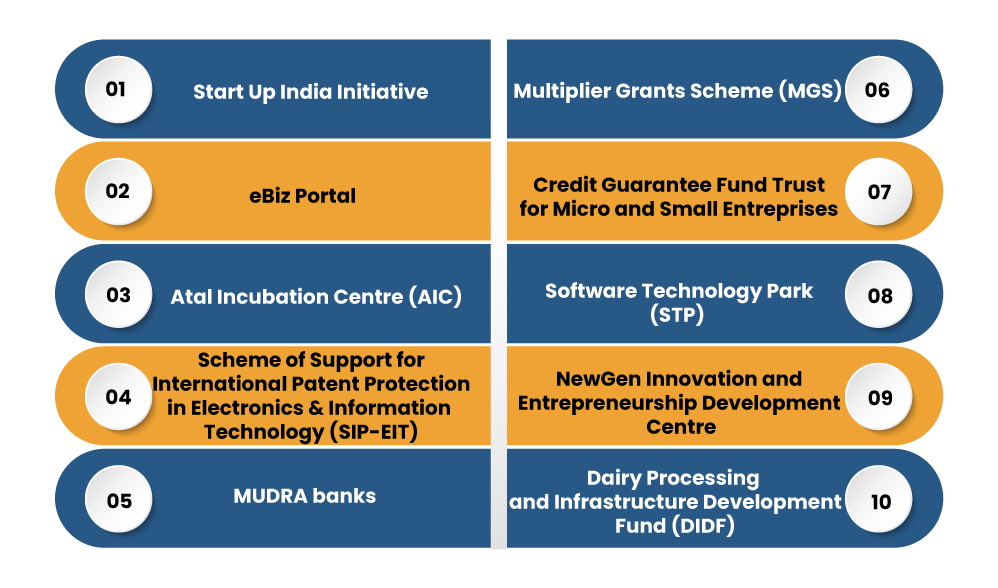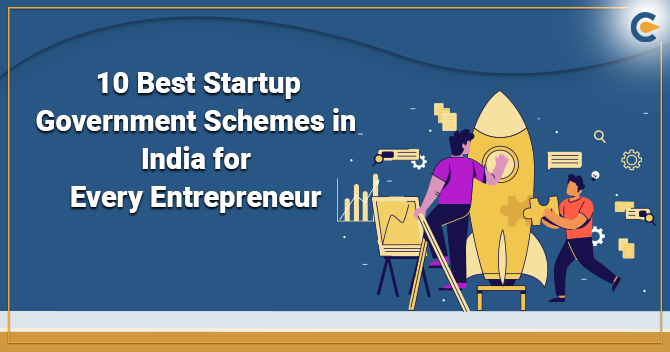Startup India is a business hub and a one-stop platform for all the stakeholders in the ecosystem of the Startup for the purpose to work together, exchange information and knowledge and form a booming partnership with each other in a highly active environment. The Government of India has come up with Startup India scheme in 2016 and has launched various Startup Government Schemes for the beneficial interests of the entrepreneurs so as to motivate them to start with their Startup business. In this article, we will know about the 10 Best Startup Government Schemes in India for Every Entrepreneur
What is a Start up Government Scheme?
A Startup is a budding firm started by one or more than one entrepreneurs with the objective of marketing and developing a unique product or service. India is having a startup boom due to the different startup Government schemes various sectors including innovation, technology, health, food, robotics, education, automobiles, and so on. The current calculation of total startups is 50,000 in India and as per the estimate records and our country is going to add another 50,000 by 2024.
Start up Government Scheme is the different kinds of scheme launched by Government of India which aims at providing various benefits and exemptions to the entrepreneurs with the purpose to motivate more and more entrepreneur to join and start with their business ideas. The Start up Government Scheme provide various financial assistance to the potential entrepreneurs and organizations in the form of loans and subsidies which shall further create employment opportunities and generate wealth in the Indian economy.
Read our article:Know the Complete Rundown of Documents Required For Startup India Registration
What are the 10 Best Startup Government Schemes in India for Every Entrepreneur?
The 10 best Startup Government Schemes in India for every entrepreneur:


- Startup India Initiative:
The government with the Start-Up India scheme has launched the I-MADE programme with the objective to help the entrepreneurs of India in creating 1 million mobile start-up apps in addition with the scheme of MUDRA Bank (Pradhan Mantri Mudra Yojana). The purpose is to provide low-interest loans and micro-finance to the entrepreneurs who are from middle or low socioeconomic background. The approval of total amount of Rs. 20,000 crore has been given for this programme.
- eBiz Portal :
This is the first platform started online for the communication which goes from the government-to-business (G2B). The major objective of the portal is to transform the country and construct an online environment that is business-friendly. The development of the eBiz Portal was done by Infosys and it was done as a part of the public-private partnership. It acts as a hub for communication for all the Indian business investors and entrepreneurs. This platform has launched 29 services in five different Indian states: Tamil Nadu, Andhra Pradesh, Haryana, Delhi and Maharashtra. The government is planning to progressively increase the service of the scheme with time.
- Atal Incubation Centre (AIC)
Atal Innovation Mission is an initiative for the promotion of the culture of entrepreneurship and innovation in India. It is a structure of whole umbrella under which it has been mandated to promote innovation by developing new programmes and policies for encouraging advancement in various sectors of the economy. It gives platform to different stakeholders for collaboration in the entrepreneurial market. It was started by NITI Aayog in 2016. The selected startups will be given the funding amount of Rs 10 crore over a time period of five years. The eligible applicants includes the researchers, students, new organizations including health, transport, energy, agriculture education, sanitation and water can apply.
The setup of the AICs can be done either in the sectors that are privately funded institutions or in the institutions that are Public funded or in the (PPP) Public-Private Partnership mode.
- Scheme of Support for International Patent Protection in Electronics & Information Technology (SIP-EIT)
SIP-EIT is a scheme that aims for giving monetary support to the technology startups and the MSMEs in order to encourage innovation and recognize the capabilities and value of IP globally and at the same time also maximize the growth of ICTE sector. The Ministry of Electronics and Information Technology (SIP-EIT) is implementing the Support for International Patent Protection in Electronics and Information Technology. Businesses that are planning for doing business in different countries should apply for getting the intellectual property rights protection as because these innovations are always at the risk of misappropriation or getting stolen. Hence, the government has implemented various measures for giving protection to them intellectually.
- MUDRA banks
MUDRA was introduced on 8 April 2015 and it comes under Pradhan Mantri Mudra Yojana (PMMY). Micro Units Development Refinance Agency was created to improve the credit facility and increase the development of small business in the rural areas. The main purpose behind launching this scheme was to support the small business that wants to develop in India. The government had allocated Rs. 10,000 crores in 2015 with the objective to encourage startup culture in India. The MUDRA banks were responsible to provide for the loan amount of up to INR 10 lakhs as a startup loans for small business enterprises that are non-farm small or micro enterprises and non-corporate. The categorization of the loans have been done as Tarun,Shishu and Kishor. There is no collateral security as the assets are formed through the finances of the bank.
- Multiplier Grants Scheme (MGS)
The Department of Electronics and Information Technology (DeitY) established the Multiplier Grants Scheme (MGS). The intention of launching the scheme is for promoting the collaboration of research and development (R&D) between academics or institutions and industry for the development of the product and package. If the industry is supporting the R&D of the items where the marketing can be done at the institutional level under the scheme, then the government shall provide the financial support which will be twice the amount as has been contributed by the industry. MGS accelerates and motivates the growth of the aboriginal goods and services. The government grants will be upto a maximum limit maximum of Rs 2 crores per project and the tenure of each project is likely to be less than two years. For the industrial associations, the cost would be Rs 4 crores for the time period of three years.
- Credit Guarantee Fund Trust for Micro and Small Entreprises
CGTMSE was established by the Government of India[1] to provide loans like zero-collateral business loan to the startups, micro and small-businesses and small enterprises. The purpose is to enable the enterprise to obtain loans at heavy subsidised rate of interest without any need for the collateral. Under this plan, the government has planned to offer a maximum amount of Rs.100 lakhs by collaborating with the SIDBI (Small Industries Development Bank of India) with the aim to promote new businesses and to rehabilitate the old ones.
- Software Technology Park (STP)
The Software Technology Park (STP) is a scheme which is focused on 100% export-oriented plan for the purpose to increase and export computer software and the professional service through physical media or communication networks. This core curriculum is exceptional as it focuses exclusively on one sector or product, particularly computer software. The initiative of the government’s programme of 100% Export Oriented Units (EOU) and the Export Processing Zones (EPZ) concept together with the proposal of Science Parks or Technology Parks, which is presently in use across the world.
- NewGen Innovation and Entrepreneurship Development Centre-
The National Science and Technology Entrepreneurship Development Board, is a component of the Government of India’s department of Science and Technology which has established the NewGen IEDC programme. The primary objective of the project is to encourage the Indian youth for developing a spirit of entrepreneurship and creativity. Through the process of coaching, counseling and assistance it aims to foster and support entrepreneurship
- Dairy Processing and Infrastructure Development Fund (DIDF):
Milk-producing enterprises, Multi-state milk cooperatives, Milk unions, State dairy federations and NDDB subsidiaries fulfills the eligibility criteria of the project and about the requirements that it can apply for a loan from NABARD. The loan would constitute the maximum rate of 80% with a minimum rate of 20% payment from the final borrower. The borrowers shall be charged with 6.5 percent of the interest rate annually on their borrowing. The amount of money that is borrowed shall determine the payback time and the duration of payback will be of ten years. The concerned State government will guarantee the loan repayment. Moreover, the state government will come forward when the borrower is not able to give his portion of the contribution to the plan.
Conclusion
India is on the verge of taking an entry in the golden age of businesses with the most qualified entrepreneurs. The mission of the Government is not only to promote these programmes for the benefit of Indian economy but also to expand the number of individuals who shall get advantage from them. It has shifted the viewpoint from searching the job to creating the job and has proved beneficial to millions of entrepreneurs.
Read our article:Benefits of Startup India Registration in India













